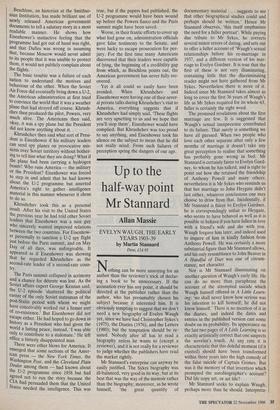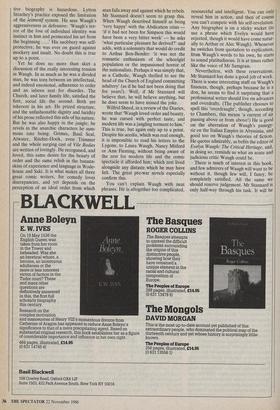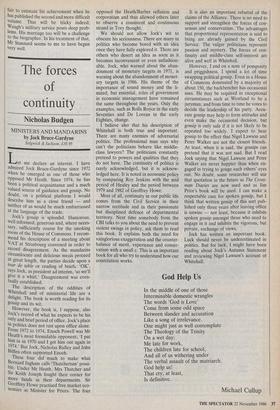Up to the half-way point Mr Stannard
Allan Massie
EVELYN WAUGH, THE EARLY YEARS 1903-39 by Martin Stannard
Dent, £14.95
Nothing can be more annoying for an author than the reviewer's trick of declar- ing a book to be unnecessary. If the accusation ever has any point, it should be directed at the publisher rather than the author, who has presumably chosen his subject because it interested him. It is obviously tempting to suggest that we don't need a new biography of Evelyn Waugh yet, since we have had Christopher Sykes's (1975), the Diaries (1976), and the Letters (1980); but the temptation should be re- sisted. Nobody after all has to read a biography unless he wants to (except a reviewer), and it is not really for a reviewer to judge whether the publishers have read the market rightly.
Mr Stannard's enterprise can anyway be easily justified. The Sykes biography was ill-balanced, very good in its way, but at its best that was the way of the memoir rather than the biography; moreover, as he wrote himself, 'the great quantity of documentary material . . suggests to me that other biographical studies could and perhaps should be written.' Hence Mr Stannard observes, 'this itself emphasises the need for a fuller portrait'. While paying due tribute to Mr Sykes, he corrects several minor errors of dating, and sets out to offer a fuller account of Waugh's sexual relationships before his re-marriage in 1937, and a different version of his mar- riage to Evelyn Gardner. It is true that the first of these is not very illuminating, containing little that the discriminating reader might not have gathered from Mr Sykes. Nevertheless there is more of it. Indeed since Mr Stannard takes almost as long to cover the first 36 years of Waugh's life as Mr Sykes required for its whole 63, fuller is certainly the right word.
The promised revelations about the first marriage are few. It is suggested that Waugh's sexual inexperience contributed to its failure. That surely is something we have all guessed. When two people who love each other separate after only a few months of marriage it doesn't take any great perception to realise that something has probably gone wrong in bed. Mr Stannard is certainly fairer to Evelyn Gard- ner, to whom he has talked, and is right to point out how she retained the friendship of Anthony Powell and many others; nevertheless it is Mr Sykes who reminds us that her marriage to John Heygate didn't last either, whatever conclusions one may choose to draw from that. Incidentally, if Mr Stannard is fairer to Evelyn Gardner, he is correspondingly unfair to Heygate, who seems to have behaved as well as it is possible to behave if you have fallen in love with a friend's wife and she with you. Waugh forgave him later, and indeed used to inquire of him in kindly fashion from Anthony Powell. He was certainly a more substantial figure than Mr Stannard allows, and his only resemblance to John Beaver in A Handful of Dust was one of circum- stance, not character. Nor is Mr Stannard illuminating on another question of Waugh's early life. He can do no more than paraphrase the account of the attempted suicide which Waugh himself offered in A Little Learn- ing: 'we shall never know how serious was his intention to kill hemself; he did not know himself.' There is no mention of it in the diaries, and indeed the dates and entries in the published version cast some doubt on its probability. Its appearance on the last two pages of A Little Learning is so exactly artistically correct that one suspects the novelist's touch. At any rate it is characteristic that this doleful moment (if it existed) should have been transformed within three years into the high comedy of the false suicide of Captain Grimes. But was it the memory of that invention which prompted the autobiographer's account? Did life copy art, or art life?
Mr Stannard seeks to explain Waugh; perhaps more than he should. Interpreta- tive biography is hazardous. Lytton Strachey's practice exposed the limitation of the leitmotif system. He sees Waugh's aggressiveness as defensive: Waugh's ter- ror of the loss of individual identity was instinct in him and permeated his art from the beginning . . .' His snobbery was self- protective; he was ever on guard against mockery and insult. No doubt this is true up to a point.
Yet he does no more than skirt a discussion of the really interesting tension in Waugh. In as much as he was a divided man, he was torn between an intellectual, and indeed emotional, adherence to order and an inborn zest for disorder. The Church, and later family life, satisfied the first, social life the second. Both are inherent in his art. He prized structure, and the unfashionable dignity and lucidity of his prose reflected this side of his nature. But he was also happy in the jungle; he revels in the anarchic characters he sum- mons into being: Grimes, Basil Seal, Atwater, Ritchie-Hook, even Trimmer and the whole surging cast of Vile Bodies are written of lovingly. He recognised, and loved, this same desire for the beauty of order and the same relish in the banana- skins of experience and language in Wode- house and Saki. It is what makes all three great comic writers, for comedy loves discrepancies, and yet depends on the perception of an ideal order from which man falls away and against which he rebels. Mr Stannard doesn't seem to grasp this. When Waugh described himself as being `very happy' with the Abdication crisis 'if it had not been for Simpson this would have been a very bitter week' — he asks `what particular pleasure he derived?' and adds, with a solemnity that would do credit to Arthur Box-Bender: 'it was not the romantic enthusiasm of the schoolgirl population or the impassioned horror of the nationalists. Perhaps it was simply that, as a Catholic, Waugh thrilled to see the head of the Church of England committing adultery' (as if he had not been doing that for years!). Well, if Mr Stannard will believe that, he will believe anything, but he does seem to have missed the joke.
Wilfrid Sheed, in a review of the Diaries, wrote that 'Waugh loved order and beauty, he was cursed with perfect taste, and modern life was a jangling torment to him.' This is true, but again only up to a point. Despite his acedia, which was real enough, it is impossible to read his letters to the Lygons, to Laura Waugh, Nancy Mitford or Ann Fleming, without being aware of the zest for modern life and the comic spectacle it afforded him; which zest lived alongside any distaste which he may have felt. The great pre-war novels especially confirm this.
You can't explain Waugh with neat phrases. He is altogether too complicated, resourceful and intelligent. You can only reveal him in action, and then of course you can't compete with his self-revelation. Any biographer is on a sticky wicket (to use a phrase which Evelyn would have rejected, though it would have come natur- ally to Arthur or Alec Waugh). Whenever he switches from quotation to explication, from Waugh's words to his own, he starts to sound platitudinous. It is at times rather like the voice of Mr Samgrass.
Nevertheless, with these reservations, Mr Stannard has done a good job of work. There is some interesting stuff on Waugh's finances, though, perhaps because he is a don, he seems to find it surprising that a professional writer should live on advances and overdrafts. (The publisher chooses to spell this `overdraught', though, according to Chambers, this means 'a current of air passing above or from above!) He is good on the aberration of Waugh's panegy- ric on the Italian Empire in Abyssinia, and good too on Waugh's theories of fiction. He quotes admirably, as befits the editor of Evelyn Waugh: The Critical Heritage, and, in doing so, reminds us what an acute and judicious critic Waugh could be.
There is much of interest in this book, and few admirers of Waugh will want to be without it, though few will, I fancy, be completely satisfied. All the same we should reserve judgement. Mr Stannard is only half-way through his task. It will be fair to estimate his achievement when he has published the second and more difficult volume. That will be tricky indeed; Waugh's military service poses deep prob- lems. His marriage too will be a challenge to the biographer. In his treatment of that, Mr Stannard seems to me to have begun very well,




























































 Previous page
Previous page